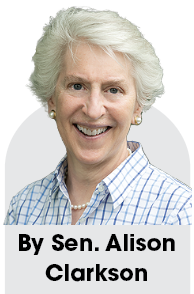 Valentine’s Day at the State House this year was surprisingly eventful and romantic. In addition to the usual round of cheer and chocolate in each committee, we celebrated the first wedding of a legislative colleague in many years. State Representative Mary-Katherine Stone married U.S. Air Force Captain Ryan Fischer on the State House steps in a short but moving ceremony. And, later that evening, the Vermont Symphony Orchestra and Chorus performed a splendid program for Farmer’s Night. Given the challenges we are facing this legislative session, it was a treat to have our spirits lightened for a day.
Valentine’s Day at the State House this year was surprisingly eventful and romantic. In addition to the usual round of cheer and chocolate in each committee, we celebrated the first wedding of a legislative colleague in many years. State Representative Mary-Katherine Stone married U.S. Air Force Captain Ryan Fischer on the State House steps in a short but moving ceremony. And, later that evening, the Vermont Symphony Orchestra and Chorus performed a splendid program for Farmer’s Night. Given the challenges we are facing this legislative session, it was a treat to have our spirits lightened for a day.
As we all know, Vermont has a housing crisis. Addressing it is one of our top legislative priorities. To that end, the Senate Economic Development, Housing and General Affairs Committee’s (SEDHGA) objective is to reduce barriers to housing development, shorten the time frame for decisions, increase the number of people required for appeals and further enable thoughtful development of housing in smart growth areas. Our housing challenge this year has been exacerbated by the flooding in 2023 and the fact that a substantial number of our affordable housing stock is in our downtowns, many of which are in flood plains. Future housing development needs to take this into consideration. We cannot afford to further invest in housing in the flood plain.
 On Friday, Feb. 16, SEDHGA Committee passed out its BE HOME (Bringing Everyone Home) housing bill, S.311. As we look at displaced flood victims and a significant number of unhoused Vermonters — bringing people home means so much more this year. Obviously more work will be done as this bill progresses through the Senate and the House. This bill makes some bold proposals. They include requiring a municipal panel to issue a decision in 180 days, increasing the number of people needed to appeal a municipal decision to a minimum of 3% of the town’s population or 25 people who participated in the municipal process. It exempts from Act 250 the development of housing units in municipalities served by water and sewer and housing along transit corridors served by water and sewer.
On Friday, Feb. 16, SEDHGA Committee passed out its BE HOME (Bringing Everyone Home) housing bill, S.311. As we look at displaced flood victims and a significant number of unhoused Vermonters — bringing people home means so much more this year. Obviously more work will be done as this bill progresses through the Senate and the House. This bill makes some bold proposals. They include requiring a municipal panel to issue a decision in 180 days, increasing the number of people needed to appeal a municipal decision to a minimum of 3% of the town’s population or 25 people who participated in the municipal process. It exempts from Act 250 the development of housing units in municipalities served by water and sewer and housing along transit corridors served by water and sewer.
S.311 calls for a study of landlord-tenant law to review what is and isn’t working in our eviction process, and we take a step to further regulate short term rental health and safety.
In addition, we create a new property transfer tax of 2.5% on seasonal residents. Vermont has the highest rate of second home ownership in the country — which is significantly impacting our housing crisis. The revenue from this one-time tax levied on seasonal home sales will go into building housing for full time residents. And the bill requires flood insurance disclosure for home sales, flood risk disclosure for residential rental agreements and for mobile home park leases.

To aid us in this housing crisis, the Natural Resources Board (NRB) issued their report suggesting updates to Act 250. S.311 incorporates the report’s recommendations, which will speed up housing development. However, these recommendations will take several years to map, approve, and implement. That’s because each town is expected, in coordination with their Regional Planning Commission, to plan and map where in their town development and housing is wanted and feasible. Once this work is complete, we will have a statewide map, built from the ground up, which makes clear what can be developed where, which areas are exempt from Act 250 and which will require going through the Act 250 process. S.311 assumes this process will take a while and makes interim provisions for housing development. For example, we propose to exempt downtowns and village centers, which are served by water and sewer, from Act 250 for ¼ mile around their designated village centers.
The bill allocates millions of dollars to support the production of more affordable housing (rentals, renovations and home ownership), middle income home ownership, repair mobile homes and improve mobile home park infrastructure, expand the Downtown Tax Credits program, and adds to the down payment assistance for first time home buyers.
Sen. Alison Clarkson can be reached by email: [email protected] or by phone at the Statehouse (Tuesday-Friday) 802-828-2228 or at home (Saturday-Monday) 802-457-4627. For more information, visit: legislature.vermont.gov.




